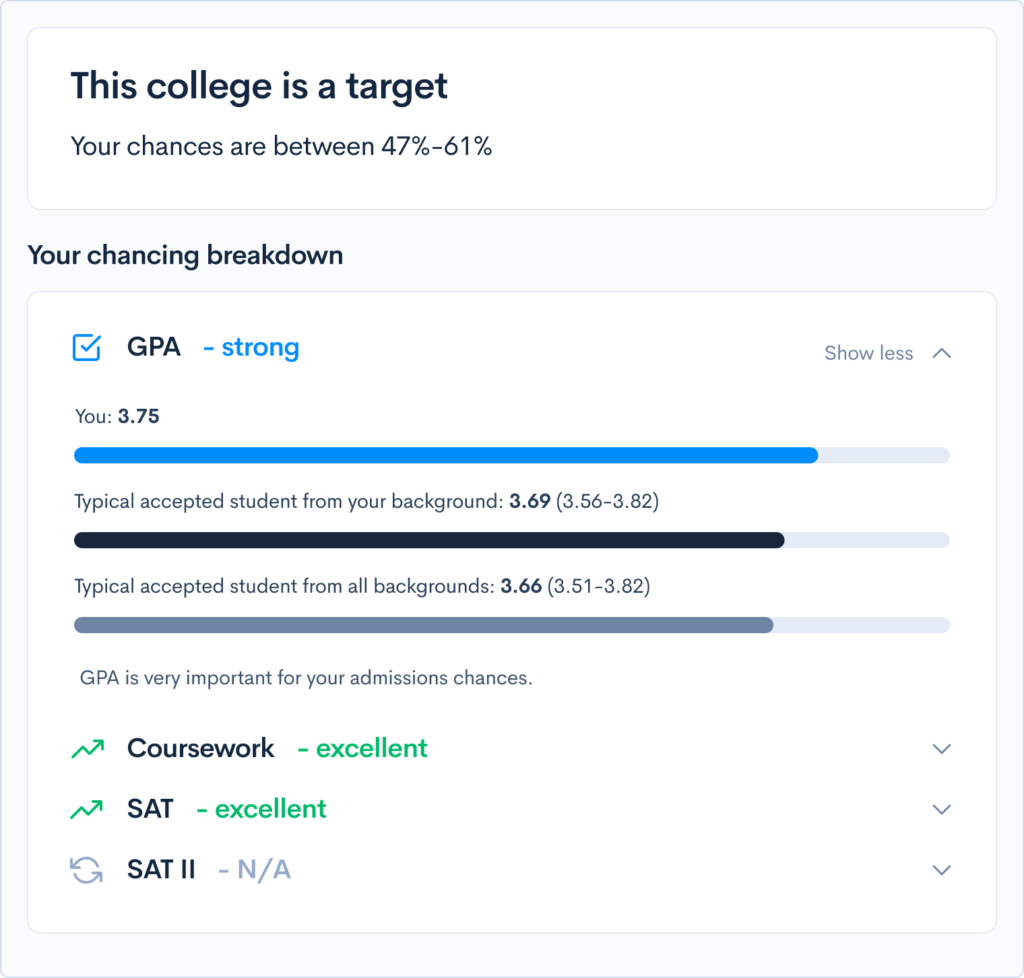10 Classes All College Students Should Take
What’s Covered:
- Why Branch Out From Your Major?
- 10 Classes Everyone Should Take in College
- How to Find the Right College For You
When you declare a major at any school, there will be certain courses you need to take. However, aside from your major or specialty, there are a variety of other courses that will be valuable throughout your life, whether for professional or personal reasons. So, when you have free space in your schedule or room for an extra course, consider taking a class that will grant you lasting life skills.
Why Branch Out From Your Major?
Often, students go to college hoping to specialize in something or explore a particular area of study, whether its business or history or math. However, colleges have hundreds, or in some cases even thousands of different courses. This may be overwhelming, but we recommend exploring different fields. Who knows, you may find a new passion!
Therefore, it would be remiss for you to enter your college experience with the intention to only explore one subject. This doesn’t mean you shouldn’t specialize because becoming an expert in a field will make you marketable on the job hunt. However, your intellectual curiosity should motivate you to take advantage of the abundance of academic opportunities available to you and expand your horizons. You can think of college as a catalyst to advance your personal growth, along with your professional development.
This article will lay out several common college courses that you might not necessarily have considered taking, but can greatly improve your knowledge as a global citizen.
10 Classes Everyone Should Take in College
1. Personal Finance
A drawback of the United States educational system is the lack of courses on financial literacy. Before you step out into the “real world,” you should have a rudimentary knowledge of different financial terms and the repercussions of different financial decisions. Ideally, you would have learned this in high school, but because of the lack of educational resources, college is often the first chance students have to learn this kind of material.
In a personal finance class, you can learn a host of topics, including but not limited to budgeting, credit, loans, and investing. These subjects will be instrumental in helping you manage your personal budget wisely and financing your future goals.
2. Public Speaking
If hearing the words “public speaking” fills you with dread, you’re in good company – according to Forbes, 80% of the population feels anxious at the thought of public speaking. Unfortunately, public speaking is a necessary evil for almost all of us.
Regardless of what your major or career path is, you’ll probably have to do a presentation, speech, or some other form of public speaking at some point. Being able to speak coherently and effectively in front of others is a skill useful in all aspects of life – whether it be giving a speech at a friend’s wedding, presenting a PowerPoint to your boss, or accepting a prestigious award.
Taking a public speaking course in college is a great first step to overcoming the fear about speaking in front of others. It’s a smart way to prepare you for whatever presentations or public speaking you may have to do within your college courses. Also, it will grant you skills that you can continue to implement well beyond college.
3. Writing
Even if you’re a “math person,” you should take a writing focused course. A collegiate writing class will teach you how to get your ideas onto paper and articulate your thoughts. Enhancing your writing skills is extremely important, since writing applies to all fields. Whether it be abstract calculus or renaissance studies, being able to clearly communicate through writing is an integral part of every subject. You should learn how to write in a way that sounds professional, which will be necessary beyond graduation, like when drafting emails or creating presentations.
Taking a writing class may also help you expand your vocabulary and discover new styles of writing. For example, learning how to use persuasive language might help you with grant writing in the future. If you enjoy story-telling or you’d like to exercise your creative side, you might even consider taking a creative writing course to hone your ideas into coherent stories.
4. Social Psychology
In a social psychology class, you’ll learn about different types of people, the overarching structures that govern everyday life, and hierarchy and power. These types of classes teach you to look at the world in new ways and understand your personal biases.
Social psychology will help you shape your world view and change your mindset in a way that allows you to become a better global citizen. The topics you’ll learn will allow you to be more understanding and empathetic towards others. Also, social psychology will be a fun learning experience, as the material is both engaging and eye opening. You’ll learn to see the world from a different perspective!
5. Environmental Science
As climate change becomes more dire, people are looking to the next generation to combat it and find innovative solutions. An environmental science class will help you understand topics like the atmosphere, land, and water, along with humans’ impact on the natural world (such as pollution, carbon emissions, etc.).
Amid conflicting viewpoints from the news, it can be difficult to stay informed. But, a college environment is a great place to gain a wealth of knowledge from reputable sources. Environmental science courses often entail cool interactive learning opportunities, including field research or visits to local natural habitats or environments. If this sounds intriguing, you should consider taking an environmental science class!
The course will also give you the tools and knowledge to make small changes in your lifestyle that can make a difference in saving the planet. These are steps everyone should be aware of!
6. Self Defense/Physical Education
Many schools offer a variety of physical education courses, and some even have it as a requirement in their core curriculum. Even if your school doesn’t offer this course for credit, there are usually classes you can take at the gym or recreation center with well-trained instructors or students who are training to work in physical fitness.
College can be a stressful experience, and you might not have the same stress-reducing outlets as you previously had. Prioritizing physical fitness is a way to strengthen yourself physically while also bettering yourself mentally. Also, college is a great time to develop strong exercise habits that you can take with you after you graduate.
Self defense in particular is a good subfield of physical training to learn because it can provide you with the life skills to feel safer. In college, many students are living alone for the first time and often have to travel places individually. While the majority of college campuses are safe, it’s always a good idea to be prepared in the event of an adverse situation.
7. Nutrition
With classes, extracurricular responsibilities, jobs, and other tasks, you might have a lot on your plate, but it is important to not bite off more than you can chew… to the point where you forget what a vegetable is and more meals consist of cereal than not! For many students, their first years of college are often the first time living on their own. This means it also might be their first time cooking for themselves on a consistent basis.
So, consider taking a nutrition class to look at your diet at the macro level. Knowing more about nutrition will also inform healthy decisions and beneficial eating habits. You might even learn about a new food or fun recipe or two that will become your favorite!

8. Civics
A civics class will teach you how to be an informed and engaged citizen. This might sound similar to high school government and politics classes, but it expands on that material and, rather than teaching you the nitty gritty of government operations, it explores your role as a citizen.
Taking a civics class will make you a more informed decision-maker and will grant you the skills necessary to understand your ability to engage with government from a local to a national level. With the right professor, civics can be a lively class, where you’ll learn to keep up with current events. You also may get the chance to participate in lively political debates, advocate for your opinion and broaden your worldviews from listening to your classmates.
9. Computer Science
As the world becomes increasingly technological, everyone could benefit from a fundamental understanding of coding. Depending on your school, introductory computer science courses teach different beginner’s coding languages. However, the importance of a computer science class lies not only in the coding aspect, but also in the fact that it teaches a logical mindset and a well-thought out way of solving problems.
Most computer science problems can be approached in numerous different ways. Thus, coding forces you to deduce the most efficient way to correctly solve a problem – a skill applicable to many other aspects of life. Also, as every device that you use in your everyday life is governed by some form of code, picking up a few computer science skills will grant you a peek into the inner workings of your smartphone or computer.
10. Gender/Sexuality/Ethnic Studies
College is a unique opportunity to broaden your horizons and learn more about yourself and those around you. Gender, sexuality, and ethnic studies classes can help you become more open-minded in your approach to your own education and your view of the world.
In these types of courses, you’ll learn about the dynamics of power within various identities, which can help you to become more compassionate and cognizant of the world around you. These courses can also help you step out of your comfort zone, as classroom discussions will often tackle difficult subjects. You may feel uncomfortable at times, but this experience is worthwhile.
These classes will also afford you the opportunity to read academic texts from women and people of color, something that is not extremely common in other academic subjects.
How To Find the Right College For You
This is by no means an exhaustive course list, and you should take care to look through the course catalogs at your prospective schools to see what courses speak to you and what your major or degree requirements will allow you to take. Your first step in this process is probably to identify schools that match your interests. Check out CollegeVine’s School Exploration tool browse our database of hundreds of schools, some of which could be your perfect match!
You can also see your chances of admission to these schools by using our free Admission’s Calculator, which will factor in not only your GPA and test scores, but your extracurriculars and demographic information as well!


